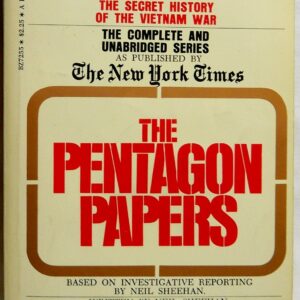Fifty years ago, on June 13, 1971, The New York Times began publishing the Pentagon Papers, a Department of Defense classified report on the United States’ involvement in Vietnam. After the federal government obtained a court order barring the Times from continuing to publish excerpts, The Washington Post began publishing them on June 18.
The 7,000-page “Report of the Office of the Secretary of Defense Vietnam Task Force,” as the Pentagon Papers were officially known, had wide-ranging constitutional and political impact.
The quiz below, from the Ashbrook Center at Ashland University, provides an opportunity for you to test your knowledge of the Pentagon Papers.
1. Which U.S. secretary of defense commissioned the report that came to be known as the Pentagon Papers?
A. Thomas Gates
B. Clark Clifford
C. Robert McNamara
D. Melvin Laird
2. Research included in the Pentagon Papers revealed which of the following?
A. The government’s claims about the Gulf of Tonkin incident were not completely accurate
B. President Lyndon B. Johnson was planning war with North Vietnam as early as 1964
C. The U.S. intelligence community was against the bombing of North Vietnam
D. All of the above
3. Who leaked the Pentagon Papers to the press, without authorization, and with what university was he affiliated?
A. Henry Kissinger, Harvard University
B. Leslie Gelb, Columbia University
C. Daniel Ellsberg, Massachusetts Institute of Technology
D. Paul Warnke, Princeton University
4. Who was president at the time the Pentagon Papers became public?
A. Richard M. Nixon
B. Lyndon B. Johnson
C. John F. Kennedy
D. Dwight D. Eisenhower
5. The federal government took its effort to stop publication of the Pentagon Papers all the way to the Supreme Court. The case, New York Times v. United States, focused on which important issue?
A. Freedom of the press
B. Government censorship
C. Prior restraint
D. All of the above
6. In New York Times v. United States, the federal government argued the Pentagon Papers should not be published because of:
A. National security issues
B. Risk to U.S. soldiers abroad
C. Impact on the economy
D. Lack of constitutionality
7. The New York Times prevailed in New York Times v. United States. Which well-known Supreme Court Justice was among the three dissenters in the case?
A. Justice William Brennan Jr.
B. Chief Justice Warren Burger
C. Justice Hugo Black
D. Justice Thurgood Marshall
8. The president during the release of the Pentagon Papers created a special unit charged with stopping the leaking of confidential information. What was the group’s nickname?
A. Cold War Hawks
B. Rand Rebels
C. White House Plumbers
D. Silent Majority
9. The same special unit also broke into the Democratic National Committee headquarters, which was the beginning of what major political scandal?
A. Teapot Dome
B. Watergate
C. Eagleton Affair
D. Muldergate
10. The entirety of the Pentagon Papers was not made available to the general public until the National Archives did so in what year?
A. 1975
B. 1991
C. 2001
D. 2011
Answers: 1-C, 2-D, 3-C, 4-A, 5-D, 6-A, 7-B, 8-C, 9-B, 10-D

